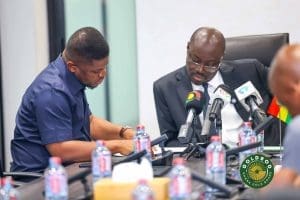Tribunal to hear appeals against GoldBod inaugurated

The Ministry of Finance yesterday hosted the official inauguration of the Gold Board Tribunal, an ad-hoc appellate body established under the Ghana Gold Board Act, 2025, to hear appeals against decisions of the Ghana Gold Board (GoldBod).
Finance Minister, Dr. Ato Forson, presided over the ceremony and formally swore in the tribunal’s first leadership, charging them to uphold integrity and fairness in their new mandate.
The three-member tribunal will serve as an independent body with powers equivalent to the High Court.
Its rulings will be binding, although aggrieved parties may escalate appeals to the Court of Appeal.
Inaugural leaders take oath of office
Chairperson Biadala Mortey Akpadzi, together with members Hamidu Mariam and Justin Pwavra Teriwajah, took their oaths of office in the presence of GoldBod Chief Executive Officer, Sammy Gyamfi Esq., officers of the board, and representatives of the governing council.

Dr. Forson underscored the tribunal’s critical role in balancing regulatory oversight with justice and fairness, especially in licensing disputes and matters handled by GoldBod’s Dispute Resolution Committee.
“The tribunal is designed to ensure transparency, due process and professional adjudication in Ghana’s gold sector,” he said, stressing that the credibility of the country’s mineral governance framework depended on the impartiality of institutions such as the tribunal.
Mandate and composition
The Gold Board Tribunal is a non-permanent body that will be convened whenever disputes or appeals arise.
By law, it must comprise a chairperson with either strong legal expertise or substantial gold industry experience, and two additional members with backgrounds in minerals and mining law, commerce, or other relevant fields.
Its core functions include reviewing appeals relating to GoldBod’s licensing decisions and disputes resolved at the committee level. Industry observers believe the tribunal will provide a fairer, more transparent mechanism for handling disagreements in the gold sector while giving investors confidence in Ghana’s regulatory processes.
A tribunal with legal weight
What distinguishes the Gold Board Tribunal is the legal authority granted to it under the Ghana Gold Board Act, 2025.
Its decisions carry the same weight as judgments delivered by the High Court.
This makes it not merely an advisory or administrative body, but a judicial forum whose rulings are enforceable under Ghanaian law.
Parties dissatisfied with its outcomes may still pursue their cases at the Court of Appeal, but the tribunal is expected to provide a faster, specialized channel for resolving disputes in Ghana’s gold trading and mining ecosystem.
Commitment to credible oversight
Industry analysts have described the inauguration as a significant milestone in Ghana’s effort to modernize its regulatory architecture for gold mining and trading.
By creating a dedicated appellate forum, Ghana signals its intention to align oversight mechanisms with international standards, bolstering transparency and accountability in one of its most critical export sectors.
Dr. Forson urged the new leadership to “set the gold standard” in dispute resolution, combining technical expertise with fairness to build confidence among both local and international stakeholders. He also called on the tribunal to operate with a sense of urgency, ensuring that disputes do not linger to the detriment of industry players or the broader economy.
The establishment of the Gold Board Tribunal follows broader reforms under the Ghana Gold Board Act, which seeks to harmonize licensing procedures, improve regulation of small- and large-scale gold operations, and position Ghana as a leader in responsible gold trading.
With the tribunal now functional, stakeholders believe the gold sector will see reduced bottlenecks in licensing processes and a structured pathway for addressing grievances.
This, in turn, is expected to create a more predictable business environment, attract new investments, and strengthen Ghana’s reputation as a transparent and well-regulated mining jurisdiction.


